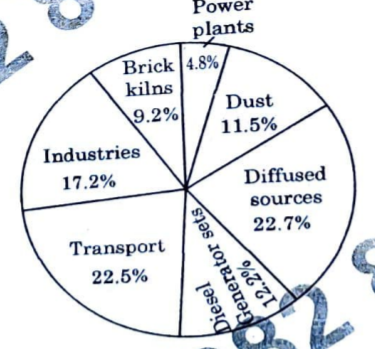Read the passage given below:
1. Air pollution is a major threat to human health. The United Nations Environment Programme has estimated that, globally, 1.1 billion people breathe in unhealthy air. The World Health Organization (WHO) has estimated that urban air pollution is responsible for approximately 800,000 deaths and 4.6 million people lose their lives every year around the globe.
2. Traffic and transportation problems, inadequate drainage facilities, lack of open spaces, carbon emission, and the accumulation of waste aggravate the problem. Air pollution is associated with increased risk of acute respiratory infections (ARI), the principal cause of infant and child mortality in developing countries.
3. Urban air quality in most mega cities has been found to be critical and Kolkata is no exception to this. An analysis of ambient air quality in Kolkata was done by applying the Exceedance Factor (EF) method where the presence of listed pollutants' (RPM, SPM, NO2, and SO2) annual average concentration are classified into four different categories, namely critical, high, moderate, and low pollution. Out of a total of 17 ambient air quality monitoring stations operating in Kolkata, five fall under the critical category,and the remaining 12 locations fall under the high category of NO2 concentration, while for RPM, four record critical, and 13 come under the high pollution category. The causes of high concentration of pollutants in the form of NO2 and RPM have been identified in earlier studies as vehicular emission (51.4%), followed by industrial sources (24.5%) and dust particles (21.1%).
4. Later, a health assessment was undertaken with a structured questionnaire at some nearby dispensaries which fall under areas with different ambient air pollution levels. Three dispensaries have been surveyed with 100 participants. It shows that respondents with respiratory diseases (85.1 %) have outnumbered waterborne diseases (14.9%) and include acute respiratory infections (ARI) (60%),chronic obstructive pulmonary diseases (COPD) (7.8%), upper track respiratory infection (UTRI) (1.2%), Influenza (12.7%) and acid- fast bacillus (AFB) (3.4%).
5. To live a healthy life and have better well-being practising pollution-averting practies can only be possible when awareness among the masses is generated that the air, they breathe outdoors, is not found to be safe.

Based on your understanding of the passage choose the correct options :
The author's opinion on the development of Mega cities is
Cities face transportation problem due to heavy traffic
Urbanization leads to deterioration of air quality
Mega cities are are the right spots to study air pollution .
Cities face the problem of congestion .
Step by step video & image solution for Read the passage given below: 1. Air pollution is a major threat to human health. The United Nations Environment Programme has estimated that, globally, 1.1 billion people breathe in unhealthy air. The World Health Organization (WHO) has estimated that urban air pollution is responsible for approximately 800,000 deaths and 4.6 million people lose their lives every year around the globe. 2. Traffic and transportation problems, inadequate drainage facilities, lack of open spaces, carbon emission, and the accumulation of waste aggravate the problem. Air pollution is associated with increased risk of acute respiratory infections (ARI), the principal cause of infant and child mortality in developing countries. 3. Urban air quality in most mega cities has been found to be critical and Kolkata is no exception to this. An analysis of ambient air quality in Kolkata was done by applying the Exceedance Factor (EF) method where the presence of listed pollutants' (RPM, SPM, NO_(2), and SO_(2)) annual average concentration are classified into four different categories, namely critical, high, moderate, and low pollution. Out of a total of 17 ambient air quality monitoring stations operating in Kolkata, five fall under the critical category,and the remaining 12 locations fall under the high category of NO_(2) concentration, while for RPM, four record critical, and 13 come under the high pollution category. The causes of high concentration of pollutants in the form of NO_(2) and RPM have been identified in earlier studies as vehicular emission (51.4%), followed by industrial sources (24.5%) and dust particles (21.1%). 4. Later, a health assessment was undertaken with a structured questionnaire at some nearby dispensaries which fall under areas with different ambient air pollution levels. Three dispensaries have been surveyed with 100 participants. It shows that respondents with respiratory diseases (85.1 %) have outnumbered waterborne diseases (14.9%) and include acute respiratory infections (ARI) (60%),chronic obstructive pulmonary diseases (COPD) (7.8%), upper track respiratory infection (UTRI) (1.2%), Influenza (12.7%) and acid- fast bacillus (AFB) (3.4%). 5. To live a healthy life and have better well-being practising pollution-averting practies can only be possible when awareness among the masses is generated that the air, they breathe outdoors, is not found to be safe. Based on your understanding of the passage choose the correct options : The author's opinion on the development of Mega cities is by English experts to help you in doubts & scoring excellent marks in Class 12 exams.
Topper's Solved these Questions
- BOOK - XII BOARDS PREVIOUS YEARCHAPTER - QUESTION PAPER 2022 TERM 1 SET 1EXERCISE - SECTION-B (WRITING AND SKILLS)12videos
QUESTION PAPER 2022 TERM 1 SET 1
- BOOK - XII BOARDS PREVIOUS YEARCHAPTER - QUESTION PAPER 2022 TERM 1 SET 1EXERCISE - SECTION-C (LITERATURE)30videos
QUESTION PAPER 2022 TERM 1 SET 1
- BOOK - XII BOARDS PREVIOUS YEARCHAPTER - QUESTION PAPER 2022 TERM 1 SET 2EXERCISE - SECTION-C (Literature)30videos
QUESTION PAPER 2022 TERM 1 SET 2
Similar Questions
Mrs. Sujatha wants to rent out the first floor of her house. She decides to draft an advertisement to be published in a national daily. Choose the correct option under which heading she can publish her advertisement .
02:43View SolutionRead the extract given below to attempt the questions that follow :
Mukesh insists on being his own master 'I will be a motor mechanic '' he announces.
Do you know anything about cars ? I ask.
''I will learn to drive a car' he answers , looking straight into my eyes. His dream looms like a mirage amidst the dust of streets that fill his town Firozabad , famous for its bangles . It is the centre of India's glass blowing industry where families have spent generation working around furnaces , welding glass, making bangles for all the women in the land it seems .
Mukesh's family is among them . None of them know that it is illegal for children like his to work in the glass furnaces with high temperatures.....
What does the author try to convey by the expression being his own master ?03:21View SolutionThe experience had a deep meaning for me, as only those who have known stark terror and conquered it can appreciate. In death there is peace. There is terror only in the fear of death, as Roosevelt knew when he said, "All we have to fear is fear itself." Because I had experienced both the sensation of dying and the terror that the fear of it can produce, the will to live somehow grew in intensity.
Choose the option that best explains the expression 'deep meaning in the extract.06:27View Solutionक्लोरोफॉर्म को प्रकाश एवं वायु के प्रभाव से बचाने के लिए क्या सावधानियाँ बरती जाती है?
10:55View Solutionसफेद फॉस्फोरस तथा सोडियम दोनों ही वायु क्रिया करते हैं। इसके निवारण के लिए फास्फोरस को जल में रखा जाता है परन्तु सोडियम को किरोसिन में । कारण देते हुए स्पष्ट कीजिए ।
15:50View Solutionनिम्न का कारण स्पष्ट कीजिए - (क) जलोद्भिद में वायु अवकाश अत्यधिक विकसित होते है ,(ख) मध्योद्भिद पौधों को नमक के जल में रखने पर वे मर जाते है |
07:33View Solutionप्रदूषण से आप क्या समझते है । यह कितने प्रकार का होता है। वायु प्रदूषण के कारणों का उलेख कीजिए । वायु प्रदूषण के नियंत्रण के उपाय बयाइए ?
05:16View Solutionजल प्रदूषण से आप क्या समझते है ? जल प्रदूषण के कारणो तथा मानव स्वास्थ्य पर इसके प्रभाव की विवचेना कीजिए । जल प्रदूषण नियन्त्रण के उपायो का उलेख कीजिए ।
03:05View Solutionजल प्रदूषण से आप क्या समझते है ? नदियों के प्रदूषण के कारणों और उनके नियंत्रण के उपाय लीखिए ।
02:54View Solutionवायु प्रदूषण से आप क्या अभिप्राय है ? प्राथमिक तथा दूतीयक प्रदूषकों में विभेद कीजिए । ओजोन कवच पर वायु प्रदूषण के प्रभाव के वर्णन कीजिए ।
01:33View Solutionमहानगरों में होने वाले वायु तथा जल प्रदूषण के कारणों का उल्लेख कीजिए ।
02:11View Solutionनिम्नलिखित में से कौन वायु प्रदूषक अम्ल वर्षा का कारण है ?
07:03View Solutionएक छात्रावास के मासिक व्यय का एक भाग नियत है तथा शेष इस पर निर्भर करता है कि छात्र ने कितने दिन भोज- जब एक विद्यार्थी A को, जो 20 दिन भोजन करता है, ₹1000 छात्रावास के व्यय के लिए अंदा करने पड़ते हैं, विद्यार्थी B को, जो 26 दिन भोजन करता है छात्रावास के व्यय के लिए ₹1180 अदा करने पड़ते हैं। नियत व्यय के भोजन का मूल्य ज्ञात कीजिए।
02:36View Solutionकिसी ऐसे वर्ष में जो लीप वर्ष न हो 53 रविवार होने की प्रायिकता क्या है ?
02:04View Solutionएक यौगिक MpXq में X की घनीय संवृत संकुलन (ccp) व्यवस्था है । इसकी इकाई सेल नीचे दी गई है । यौगिक का मुलानुपाती सूत्र है ।
 01:29View Solution
01:29View Solutionनाइट्रिक ऑक्साइड वायु द्वारा ऑक्सीकृत होकर लाल भूरे रंग की गैस निकलती है, यह गैस -
02:31View Solution

